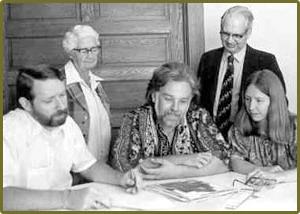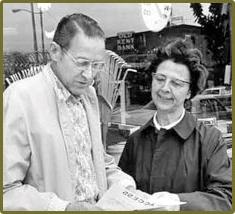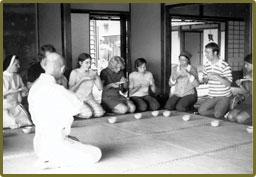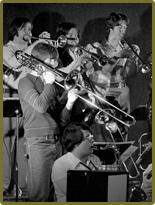Heritage & Traditions at Aquinas College
1970 to 1979
1970 to 1973
1970
Changes:
May: The College unveils the new governance structure which came out of the 15-month long Self-study. It includes an Academic Assembly and a Community Senate in an innovative structure in which students, faculty and administrators hold seats in each of the legislative bodies. This mixing of students in the governing bodies of the College reflected the spirit of student involvement of the 1960s and 1970s.
Other programs begin as part of the college's attempt to explore untapped markets of students. The new programs include Summer School Without Walls; College Expectations, a summer program for college-bound high school students; Coach Terry Bocian's athletic summer camps; and Bruce Early's summer music camps.
New majors are added to the curriculum, including Communication, Geography, and Religious Studies.
Some old programs are phased out. The theater program in the Carriage House has to be discontinued because of fire marshal concerns about the building. The Aquinas Institute for Religious Education (AIRS) program is discontinued.
 In 1969-70, Aquinas undertakes a complete self-study, reexamining the college from
top to bottom. It is a collaborative effort taking 15 months and involving administrators,
faculty, staff and students.
In 1969-70, Aquinas undertakes a complete self-study, reexamining the college from
top to bottom. It is a collaborative effort taking 15 months and involving administrators,
faculty, staff and students.
 At left: The innovative Encore Program made it possible for mature women to complete
their college degrees. With flexible and unusual class hours, Encore responded to
the special needs of women who had either never begun college or who had left their
degrees incomplete as they raised their families in the 1950's and 1960's. In the
forefront of making educational opportunities available to women, Aquinas's Encore
program led to many calls of "Yay, Mom!" on graduation day and launched women into
careers.
At left: The innovative Encore Program made it possible for mature women to complete
their college degrees. With flexible and unusual class hours, Encore responded to
the special needs of women who had either never begun college or who had left their
degrees incomplete as they raised their families in the 1950's and 1960's. In the
forefront of making educational opportunities available to women, Aquinas's Encore
program led to many calls of "Yay, Mom!" on graduation day and launched women into
careers.
1971
 Eastown: The main movers of the Eastown project. In back row, Dr. Norbert Hruby, president
of Aquinas College; Sr. James Rau, O.P. Front, from left, Aquinas faculty Linda Easley,
Thomas Edison, and Michael Williams.
Eastown: The main movers of the Eastown project. In back row, Dr. Norbert Hruby, president
of Aquinas College; Sr. James Rau, O.P. Front, from left, Aquinas faculty Linda Easley,
Thomas Edison, and Michael Williams.
The Eastown Community Association is founded in 1973 and is funded for the first three years of its existence by a grant from the W.K. Kellogg Foundation, obtained by the College. Aquinas professors Tom Edison, Linda Easley and Michael Williams, and Sr. James Rau produce "Eastown!," a nationally distributed book which is a case-study of how a not-for-profit institution like Aquinas can preserve the neighborhood in which it is situated.

Sr. Aquinas Weber O.P. confers with Jim Geib, manager of the Hammer and Cortenhof Hardware Store in Eastown. The first Eastown Street Fair in 1973 becomes a neighborhood tradition. Wealthy Street is closed down and area businesses sponsor concerts and food booths celebrating the area eventually self-described as "Grand Rapids' hippest neighborhood."
1972

Ms. Betty Jennings tries her hand at the harp during
one of the early Ireland program semesters.

The turbulent early 1970's shift everything from academic programs to styles of dress and hair.
Semester-in-Ireland program is begun by Gertrude Horgan first in Lewistown, Ireland, but moves the following year to Tully Cross where it finds its permanent home. A cultural immersion trip for students that would not require foreign language competency, the semester in Ireland program becomes one of the college's most enduring programs.
Co-educational residence halls become a sign of the changing times as the old in loco parentis rules fade into the past. Students adjust to the new living arrangements.
1973
Administrators, faculty and student representatives participate in an all-college retreat at Harbor Springs, Michigan. The goal of the Harbor Springs retreat was to continue the work of the institutional self-study of the late 1960s.
1974 to 1976
1974
Controversy: Commencement speaker Shirley Chisholm appears amidst much controversy. Chisolm, U.S. Congresswoman from the Bedford-Stuyvesant area of New York City and figure during the Watergate hearings, had been a supporter of Roe v. Wade, and this support caused an outcry, including death threats. She delivered her Commencement address under tight security.
 To hear more about the controversy, click here. This audio clip is from "Historically Speaking," an oral history of Aquinas College.
To hear more about the controversy, click here. This audio clip is from "Historically Speaking," an oral history of Aquinas College.

Foreign travel: Aquinas students (from left) Alice Popiel, Tim Wessley, Janet Robach and others join Sr. Thomasine Bugala O.P. and a Zen Buddhist monk for a tea ceremony in Kyoto, Japan.

Bernadette Robach, Mary Jo Muench, Michelle Robach, Tom Engebretsen (from left) and Sr. Thomasine Bugala O.P. have tea with a Buddhist monk in Kyoto, Japan, 1974. For many years, Sr. Thomasine helped Aquinas graduates get English language teaching positions in Japan.

Renowned theologian Bernard Lonergan S. J. speaks during the 1974 celebration of St. Thomas Aquinas' 700th anniversary. The year long festivity was punctuated with programs commemorating the renowned medieval Catholic theologian after whom the school was named.

Rev. Mark Heath O.P. preached at the opening Mass of the festivities celebrating the 700th anniversary of the death of Thomas Aquinas, January 27.

A new organization structure: C. Arthur Woodhouse, the first lay member of the Aquinas College Board of Trustees. In 1974, the Board of Trustees became legally independent of the Grand Rapids Dominicans for the first time.

Career focused education: A 1970s business student experiences work in the real world. Note the state of the art computer equipment.

Student Al Duke serves an internship as an assistant in the Work Release Program at the Kent County Correctional Facility, 1975, one of many innovative programs designed by the college in the wake of the Self-Study.

Joe McCormick takes water samples as part of his field experience in 1975. New programs in the 1970's responded to market needs and focused on job preparation.
 At left: In the 1975-76 season, the Aquinas College "Tommies" become "the Saints"
after African-American athletes were taunted on the road for being "Toms." In those
politically charged times, the name had acquired negative connotations, and the nickname
"Saints" was chosen by a student-conducted poll and has been in use since.
At left: In the 1975-76 season, the Aquinas College "Tommies" become "the Saints"
after African-American athletes were taunted on the road for being "Toms." In those
politically charged times, the name had acquired negative connotations, and the nickname
"Saints" was chosen by a student-conducted poll and has been in use since.
1976
Emeritus College: Emeritus College begins in late 1975 with an exploratory program of seminars aimed at seniors led by professor Ken Marin. It soon becomes clear that seniors do not want programs focused solely on retirement issues but have a wide-ranging interests in the arts, politics and other academic topics. The Emeritus program becomes one of the first educational programs in the United States to focus on serving the educational needs and interests of the over-fifty population.
1977 to 1979
1977
The Master of Management program is accredited. The success of the Career Action Program led the college to explore offering a graduate business degree, but one that would not focus on MBA-style number crunching. Keeping with the college's humanistic tradition, the Master of Management degree gives students the skills they need to advance their careers by learning to better manage employees, do strategic planning, and effectively motivate workers. Small class, sizes, convenient course times, and flexible scheduling - hallmarks of Aquinas at the time--made the program a success from the start.

Internships: The 1970s saw a rise in the number of preprofessional internships offered as part of a student's preparation for careers. Here a student intern works in a laboratory

Student Mark John experiences field research first hand, taking samples from a nearby river.
1978
 Coach Terry Bocian becomes Athletic Director, and women's coach Pattie Tibaldi leads teams to victory
after victory in the 1970's and 1980's.
Coach Terry Bocian becomes Athletic Director, and women's coach Pattie Tibaldi leads teams to victory
after victory in the 1970's and 1980's.
After a fire, the former stable is renovated as the Pastoral Center. It's name is changed to Bukowski Pastoral Center in 1989 to honor the recently-deceased former president who served the college for over thirty years.
(At left) The beer tent becomes a regular feature of Gala Weekend, here pictured in 1978.

One of the first programs in the United States to promote for seniors, Emeritus College becomes a leader in life-long education. Emeritus College predates the Elderhostel movement by at least one year, and offers life-enriching classes for people 55 and older.

Women's basketball is introduced in 1978. Under coach and women's athletic director Patti Tibaldi, Aquinas becomes a powerhouse team in the 1980's. Women's sports blossom in the 1970's, with the addition of softball (1977), volleyball (1979), women's track and field (1979-80).

Sr. Jean Paul Tilmann, O.P., and Sr. Aquinas Weber O.P. stand at the intersection of Lake Drive and Wealthy Street, the hub of the Eastown district.

The first Aquinas College Jazz Festival is held in 1978, organized by Dr. Bruce Early. Drawing college jazz bands from around the Midwest, the annual Jazz Festival becomes a fixture at Aquinas for thirty years, giving student musicians the opportunity to learn from and play with outstanding professional jazz artists.

Aquinas College's annual Jazz Festival made the College synonymous with jazz for many in West Michigan.

In October, 1979, students celebrate Oktoberfest with a tug of war wearing classy Alpine hats. For many years, Gala Weekend had an Oktoberfest theme.

The College begins to enter the new age of computers under the guidance of newly hired faculty member Tom Dooley and veterans Lee Jacokes and Charles Frydrych. Since the era of personal computing is just beginning, the early efforts are very much improvisational, with students and faculty learning about the new machines simultaneously.
CONTACT INFO
AQ History
Ryan Wendt
aqhistory@c178.net